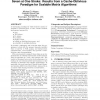Free Online Productivity Tools
i2Speak
i2Symbol
i2OCR
iTex2Img
iWeb2Print
iWeb2Shot
i2Type
iPdf2Split
iPdf2Merge
i2Bopomofo
i2Arabic
i2Style
i2Image
i2PDF
iLatex2Rtf
Sci2ools
140
click to vote
ACMMSP
2006
ACM
2006
ACM
Seven at one stroke: results from a cache-oblivious paradigm for scalable matrix algorithms
A blossoming paradigm for block-recursive matrix algorithms is presented that, at once, attains excellent performance measured by • time, • TLB misses, • L1 misses, • L2 misses, • paging to disk, • scaling on distributed processors, and • portability to multiple platforms. It provides a philosophy and tools that allow the programmer to deal with the memory hierarchy invisibly, from L1 and L2 to TLB, paging, and interprocessor communication. Used together, they provide a cacheoblivious style of programming. Plots are presented to support these claims on an implementation of Cholesky factorization crafted directly from the paradigm in C with a few intrinsic calls. The results in this paper focus on low-level performance, including the new Morton-hybrid representation to take advantage of hardware and compiler optimizations. In particular, this code beats Intel’s Matrix Kernel Library and matches AMD’s Core Math Library, losing a bit on L1 misses while winning decisivel...
| Added | 13 Jun 2010 |
| Updated | 13 Jun 2010 |
| Type | Conference |
| Year | 2006 |
| Where | ACMMSP |
| Authors | Michael D. Adams, David S. Wise |
Comments (0)

